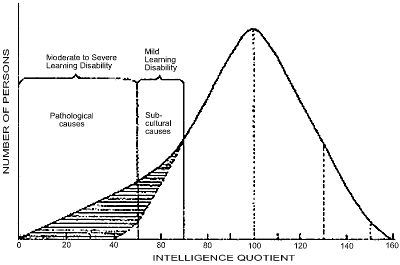Aetiology
|
|
IQ levels follow a normal distribution curve for IQ's above 70. For lower levels of IQ the curve is skewed due to the addition of pathological (organic) causes of learning disability. The organic causes of learning disability are indicated by the shaded area on the diagram below.

Distribution of intelligence in the population
from Companion to Psychiatric Studies. R Kendall & A Zeally Eds.
Mild learning disability
These individuals form part of the lower end of the normal distribution curve for IQ. Generally can communicate with spoken language.
Role of multifactorial genetic & environmental influences (which also control the variance of IQ above 70) traditionally thought most important in this group. Higher rates in social class IV & V, especially with large sibship, overcrowding & poverty point to ‘sub-cultural causes' of learning disability in this group.
But increasing evidence for organic involvement - recent studies show up to 45% have definite organic factors (subtle chromosome rearrangements, perinatal insults from toxins like alcohol).
Presently no cause found >50%, 15-20% perinatal hypoxia, 10% congenital causes, 5% defined genetic cause.
Moderate to profound level of learning disability (IQ less than 50)
Need greater degree of care, often including physical care to aid with feeding, continence etc.
Can nearly always assume organic pathology for severe & profound learning disability: chromosomal 40%, genetic 15%, pre & peri-natal 10%, post-natal 10%, unknown 25%.
Excess numbers at more severe levels (‘bump' on IQ curve) is due to organic or pathological group with cluster of disorders of definable aetiology (genetic, environment - hypoxia, trauma, infections). Some will have syndromes like autism, cerebral malformation syndromes or cerebral palsy, without yet defined cause, but presumed definite biological factors in causation.
Why is it important to find the cause of a person's learning disability?
Right of individual/family to know the cause of their learning disability.
Enable awareness of associated physical and psychiatric conditions that may be treatable.
To enable genetic counselling where appropriate.
Surprisingly few people with learning disability (especially adults) have ever been thoroughly investigated as to the cause. Paediatricians now usually investigate children with learning disability, but general practitioners and other hospital specialists may take the opportunity to do so. Psychiatrists frequently investigate and find causes for a person's learning disability relatively late in life.

This work is licenced under a Creative Commons Licence.

 Home
Home



